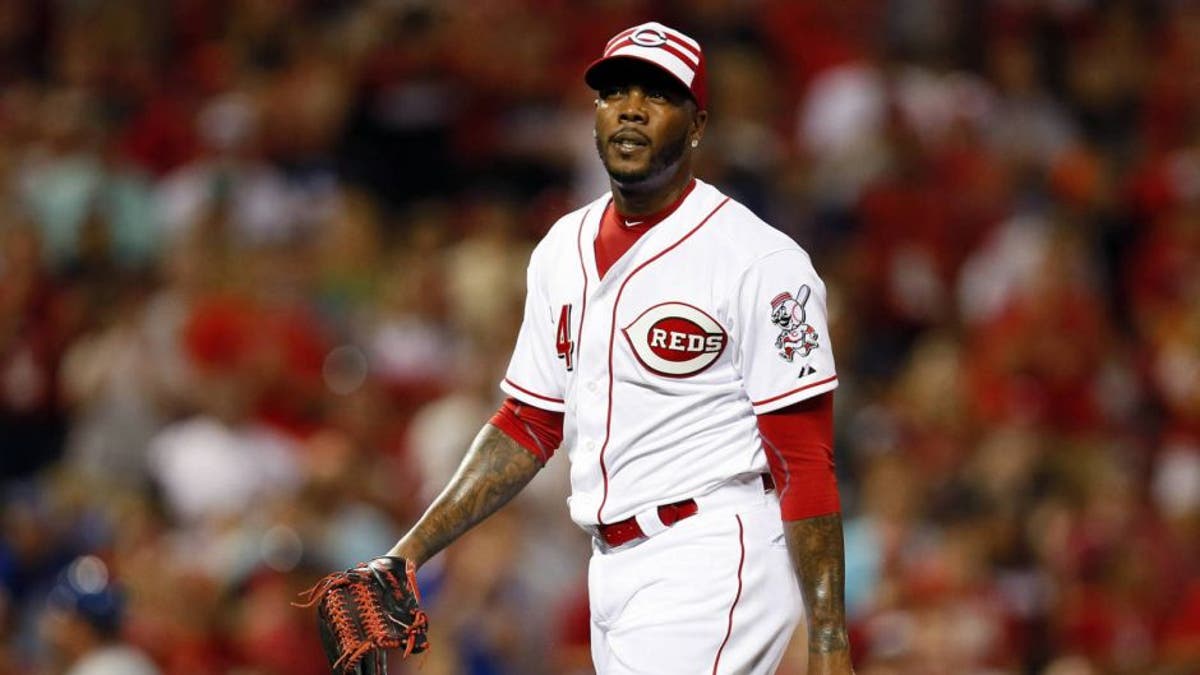
NASHVILLE, Tenn. -- The usual chatter of trades and signings at the winter meetings changed sharply in tone after Yahoo Sports reported Monday night that an alleged domestic incident involving Aroldis Chapman scuttled a trade that would have sent the closer from the Cincinnati Reds to the Los Angeles Dodgers.
Chapman's girlfriend told police he choked her and pushed her against a wall during the October incident, according to a Davie, Fla., police report cited by Yahoo Sports reporters Tim Brown and Jeff Passan. Chapman also "admitted to firing eight shots with a handgun," the Yahoo Sports story said.
Key topics to consider as the story unfolds:
* Major League Baseball will investigate the incident under its new domestic violence policy, which gives authority to commissioner Rob Manfred to discipline a player "whether the player is convicted or pleads guilty to a crime."
In this instance, Chapman was not charged, let alone convicted. But given the increased awareness surrounding domestic violence in the United States -- particularly in professional sports -- MLB will face pressure to make a strong statement through its handling of Chapman.
Chapman, Colorado Rockies shortstop Jose Reyes and Dodgers outfielder Yasiel Puig represent the first known examples of investigations under MLB's domestic policy, which was instituted in August following extensive negotiations with the players' union.
* The Reds will face serious questions about their handling of Chapman and overall front-office practices under president of baseball operations Walt Jocketty and general manager Dick Williams.
The worst-case scenario is that the Reds knew about the incident and tried to trade Chapman anyway, knowing full well that the clock probably was ticking toward a public-relations catastrophe.
If the Reds didn't know about the incident until the deal neared completion, their conduct would be less distressing. Still, that would beg the question of how the Reds weren't aware when the Boston Red Sox -- who had interest in Chapman -- learned of the incident in November while doing background work on him, according to a Boston Globe report Monday night.
According to MLB.com, Jocketty said late Monday, "The trade is still possible. We've talked to several clubs. I've notified them all tonight that we will step back for a couple of weeks or whatever it takes. They were fine. This actually came up the last 24 hours. That's not what held up the trade. We just weren't able to complete it as fast as we wanted to."
* Regardless of whether Chapman is suspended, his trade value will plummet in the aftermath of a gun-related domestic violence allegation. General managers -- and, more importantly, owners -- would rightly be concerned about the message such a trade would send to the families who buy tickets and support their teams.
It's doubtful the "several teams" Jocketty mentioned will be as enthusiastic about acquiring Chapman as they were before the winter meetings began.
* A lengthy suspension could have significant ramifications on Chapman's baseball future.
Chapman had been on track for a major payday as a free agent following the upcoming season. Now it's very possible that his market value will decrease by millions of dollars because of the incident.
Moreover, a lengthy suspension could mean Chapman no longer is assured of reaching free agency after the 2016 season. The reason: Players don't accrue MLB service time while serving domestic-violence suspensions.
Chapman will enter the season with 5 years, 34 days of major-league service. A full year of service time is 172 days. Thus, Chapman will need to be on an active roster or disabled list for at least 138 days this season in order to become a free agent next winter.
